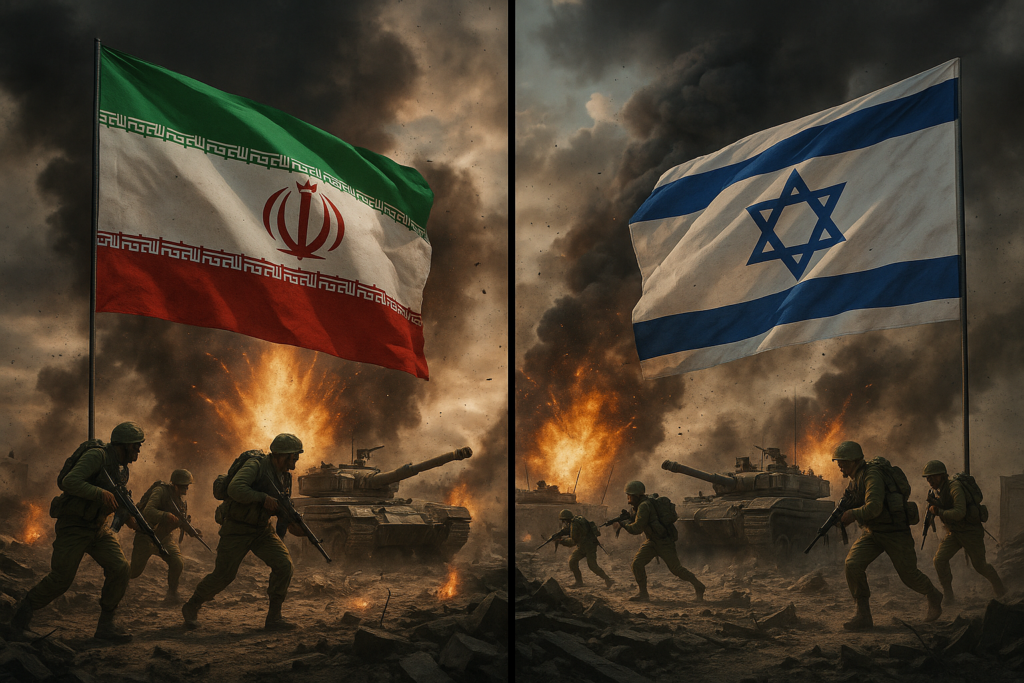The war between Iran and Israel is one of the most volatile conflicts in the Middle East, involving covert operations, cyber warfare, and threats of nuclear escalation. Now, artificial intelligence (AI) is poised to revolutionize how this shadow war is fought—making attacks faster, defenses smarter, and battlefields more unpredictable.
In this article, we explore how AI could reshape the war between Iran and Israel, from autonomous drones to AI-powered cyberattacks, and what it means for the future of warfare in the region.
Table of Contents

1. AI in Intelligence: Predicting the Next Move in the Iran-Israel War
AI-Powered Surveillance and Threat Detection
The war between Iran and Israel relies heavily on intelligence. AI can process vast amounts of data to:
- Predict missile launches before they happen.
- Track Iranian proxy movements in Lebanon, Syria, and Yemen.
- Detect hidden nuclear facilities using satellite imagery analysis.
Israel’s Mossad already uses AI to monitor Iran’s activities. If Tehran moves missiles closer to Israel’s borders, AI could flag the threat instantly—giving Israel time to strike first.
Drones and Satellites with AI Vision
Both nations use drones for reconnaissance. AI enhances this by:
- Automatically identifying military targets (missile sites, weapons shipments).
- Tracking underground tunnel networks used by Hamas and Hezbollah.
- Improving real-time battlefield awareness.
Israel’s advanced drone technology gives it an edge, but Iran is rapidly catching up—raising the stakes in the war between Iran and Israel.
2. Cyber Warfare Goes AI: A New Front in the Iran-Israel Conflict
AI-Driven Hacking and Counter-Hacking
Cyber warfare is a key battleground in the war between Iran and Israel. AI changes the game by:
- Launching hyper-fast cyberattacks that exploit vulnerabilities in seconds.
- Automatically defending against hacking attempts (Israel’s cyber units already use AI for this).
- Spreading AI-generated disinformation to manipulate public opinion.
Past cyberattacks (like Stuxnet) showed how digital warfare can cripple infrastructure. With AI, future attacks could be even more devastating.
Deepfake Propaganda in the Iran-Israel War
AI can create fake videos, audio, and social media posts that look real. Imagine:
- A deepfake video of an Israeli official declaring war, sparking panic.
- A fake Iranian military order causing confusion among troops.
If used in the war between Iran and Israel, AI-generated disinformation could escalate tensions dangerously.
3. Autonomous Weapons: AI Takes Over the Battlefield
Killer Drones That Decide Their Own Targets
Drones are already crucial in the war between Iran and Israel. AI makes them deadlier by:
- Enabling drone swarms (hundreds of AI-controlled drones attacking at once).
- Allowing autonomous strikes (no human approval needed).
- Improving precision (reducing civilian casualties).
Israel’s “Harpy” loitering drones can already detect and destroy enemy radars on their own. Iran’s Shahed-136 kamikaze drones could soon get AI upgrades—making the conflict even more unpredictable.
AI vs. Iran’s Proxy Networks
Iran relies on groups like Hezbollah and Hamas to fight Israel indirectly. AI could:
- Track and eliminate key operatives using facial recognition.
- Predict guerrilla attacks before they happen.
- Disrupt weapons smuggling routes.
If AI weakens Iran’s proxies, it could force Tehran to change tactics in the war between Iran and Israel.
4. AI in Missile Defense: Can Israel Stop Iran’s Rockets?
Upgrading Israel’s Iron Dome with AI
Israel’s Iron Dome is one of the world’s best missile defense systems. AI could make it even stronger by:
- Distinguishing real missiles from decoys.
- Improving interception accuracy.
- Reducing costs by prioritizing threats.
If Iran launches a massive rocket barrage (like in past conflicts), AI could help Israel block more attacks.
The Hypersonic Missile Threat
Iran is developing faster, harder-to-intercept missiles. AI might be the only solution:
- Predicting flight paths in real time.
- Guiding laser defenses (like Israel’s “Iron Beam”).
Without AI, Israel could struggle to defend against Iran’s next-gen weapons.
5. AI in Psychological Warfare: The Battle for Minds
AI Bots and Social Media Manipulation
Both sides use social media for propaganda. AI makes it more powerful by:
- Creating fake accounts to spread disinformation.
- Generating deepfake videos of fake battlefield victories.
- Automating troll armies to harass enemy leaders.
In the war between Iran and Israel, AI-driven propaganda could deepen hatred and make peace harder.
AI as a Counter-Terrorism Tool
Israel could use AI to:
- Monitor extremist chats for attack plans.
- Track Iranian funding to militant groups.
- Predict terror strikes before they occur.
If successful, AI might reduce Iran’s ability to wage proxy wars.
6. Risks: Could AI Make the Iran-Israel War Worse?
Dangers of AI in Warfare
- Faster escalation (AI systems misinterpreting actions and triggering war).
- Autonomous weapons making mistakes (killing civilians by accident).
- An AI arms race (both sides developing uncontrollable tech).
Ethical Questions
- Should machines decide who lives or dies?
- Can AI be trusted not to start a war by mistake?
- Will the UN regulate AI in the war between Iran and Israel?
Conclusion: AI Could Decide the Future of the Iran-Israel War
The war between Iran and Israel is entering a new era—one where AI controls drones, hacks enemies, and even influences public opinion. While Israel has a technological edge, Iran is rapidly advancing, setting the stage for a high-tech arms race.
The big question: Will AI make war more precise—or more dangerous? One thing is certain: the future of the war between Iran and Israel will be shaped by machines as much as by soldiers.
